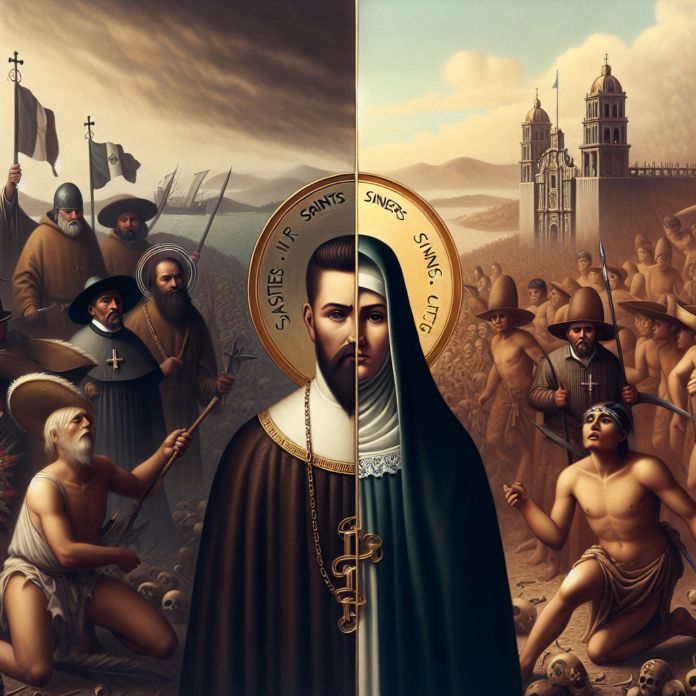Saints and Sinners: The Dual Faces of Catholic Figures in the Mexican Conquest
The Mexican Conquest stands as one of the most monumental and conflicted chapters in the history of the Americas. This complex period marks not only the subjugation of the indigenous populations but also the invasive introduction of European culture, particularly Catholicism, into the New World. Central to this historical drama are the Catholic figures who arrived with the Spanish conquistadors, intent on spreading their faith. These individuals range from the ostensibly saintly missionaries dedicated to the well-being of indigenous souls to cynically opportunistic clergy who aligned themselves with the oppressors for personal gain. The dual faces of these Catholic figures reveal the inherent tensions between traditionalist zeal and emergent, albeit rudimentary, progressive values.
The Traditionalist Zeal: An Unwavering Commitment to Doctrine
Traditionalism found a most effective vessel in figures like Hernán Cortés, whose missionary zeal often masked a more sinister agenda. The famed conquistador’s relationship with prominent Catholic clergy illustrates a confluence of sword and cross that left the native population reeling. Historical accounts suggest that many friars and priests arrived with every intent to convert humanitarian compassion into domineering control.
For instance, the mission of Franciscan friars who followed in the wake of Cortés reveals a nuanced form of spiritual conquest. While they indeed baptized millions, these baptisms were seldom an act of grace but rather a tool of subjugation. The implicit message was clear: accept Christianity or face annihilation. This dichotomy is exemplified in the actions of Toribio de Benavente Motolinia, one of the Twelve Apostles of Mexico, who painstakingly documented the "successes" of conversions while turning a blind eye to the systemic atrocities inflicted upon the indigenous populace.
The Sinners: A Moral Vacuum in Holy Robes
If some friars represented the conflating lines between conquest and conversion, equally guilty were those who outright exploited the situation for personal gain. The scandalous indulgence in immoral behaviors by certain clergymen only deepened the cultural and social chasm. Documents from the era recount tales of ordained figures engaging in profiteering, sexual misconduct, and brutal discipline. These acts of moral bankruptcy were hardly isolated incidents, but rather indicative of an underlying rot within the ecclesiastical contingent.
One of the more infamous figures was Bishop Juan de Zumárraga. Initially positioned as a supposed protector of indigenous rights, Zumárraga quickly revealed a darker side. He played a crucial role in the brutal suppression of native idolatry, often using extreme measures to eradicate any semblance of indigenous religious practices. His participation in numerous auto-da-fé ceremonies, where "heretics" were publicly punished, underscores the dark irony of a religious leader propagating violence in the guise of spiritual purification.
The Progressive Underbelly: An Alternative Vision
Amidst such prevalent darkness, glimmers of progressive conviction shone through, offering an alternate vision for the role of the Church in these tumultuous times. The most notable among these figures is Bartolomé de las Casas, a Dominican friar who stands as a testament to early progressive thought in a sea of traditionalist dogma. Unlike his contemporaries, Las Casas vociferously opposed the brutal treatment of the indigenous people, advocating for their inherent dignity and human rights.
Las Casas’ adamant objections led to the creation of the New Laws of 1542, intended to curb the worst abuses of the encomienda system, which essentially enslaved native populations. While the laws saw limited enforcement due to powerful resistance from colonial landowners and even some within the Church, they marked the embryonic stirrings of a moral awakening. Las Casas’ efforts spotlight the possibility of a harmonious coexistence, underscoring the potential for progressive values even in an era steeped in dogmatic rigidity.
A Dual Legacy: Lessons for Modern Times
The Catholic figures during the Mexican Conquest encapsulate a dual legacy, one of both unyielding authoritarianism and nascent humanitarianism. The traditionalists, who clung to rigid interpretations of doctrine, may have perceived themselves as the bearers of salvation but more often than not, epitomized the role of oppressors. On the other hand, progressive voices like Bartolomé de las Casas, despite being rare, illuminate a path of ethical governance and intercultural respect that still resonates today.
Understanding this complex interplay is crucial for comprehending the broader implications of colonization and religious imposition. Acknowledging the failures of traditionalist figures—and the rare successes of progressive ones—offers crucial lessons on the impact of ideological rigidity versus the capacity for humanistic empathy and moral courage.
In the modern context, reflecting on this duality serves as a profound reminder: institutions, regardless of their sanctity, are vulnerable to moral corruption when unchecked by progressive values. By earnestly grappling with this history, we find ourselves better equipped to foster a future characterized not just by the fervor of conviction, but by the soft light of compassionate wisdom. Thus, while the saints and sinners of the Mexican Conquest present a deeply tangled narrative, they collectively urge us to strive for a more ethical and empathetic society.
